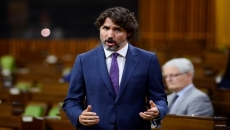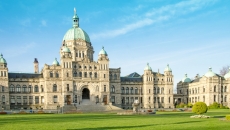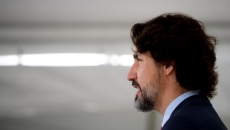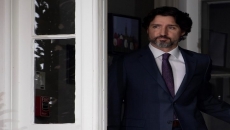A made-in-Canada mobile app to alert Canadians who may have been exposed to a person infected with COVID-19 is ready for testing in Ontario, Prime Minister Justin Trudeau announced Thursday.
Trudeau said using the app is completely voluntary and it will not share or store any personal information, including a user's geographical location.
"It will be up to individual Canadians to decide whether to download the app or not but the app will be most effective when as many people as possible have it."
The app was developed by Canadian Digital Service, Ontario Digital Service, Blackberry, and volunteers from Shopify who helped build it. The app uses Bluetooth software that was developed by phone-makers like Apple and Google. It creates and shares an anonymous identification code from your phone to any phone that also has the app and comes into close proximity with your own for an extended period of time. Your phone will also collect codes from those phones and store them for 14 days.
If you, or any of those phone owners, are diagnosed with COVID-19, public health officials will help you upload that fact to the app, and any phones that were logged by yours in the previous 14 days will receive a notification that the user may have been exposed to COVID-19. Those users will be asked to contact health authorities for help.
The United Kingdom announced Thursday that it was abandoning efforts to create their own software in favour of contact tracing apps that also use the same Bluetooth software.
Trudeau said the federal privacy commissioner was involved in the development and every consideration has been given to protecting privacy because the government is very aware that if Canadians are worried about their privacy they won't use the app.
Trudeau said the app will run in the background and not eat up much battery, and no personal information will be stored.
The logs that keep track of which phones were in contact with each other will use anonymized codes, he said.
Concerns about privacy have been paramount in discussions of contact tracing apps, and Conservative MP Michelle Rempel Garner wasted no time raising it as an issue Thursday.
"After failing to address the issue of data privacy in Canada for years, would you trust Trudeau’s app with your data (health, whereabouts, contacts, etc)," she asked on Twitter, as she created a poll to ask Canadians for their thoughts.
Ontario Premier Doug Ford is providing more information Thursday on how the app will be rolled out in his province. Trudeau said the government is working with all provinces, and that the program should be ready for downloading all across the country in July. He said some work remains to be done to integrate the app with local health units in every province.
University of Ottawa law professor Michael Geist, an expert in technology law, said using Bluetooth technology instead of GPS will be more accurate in terms of identifying people who were actually in close proximity to someone with COVID-19.
Geist said the critical piece is that a significant number of people have to download the app to make it effective.
"If you have an app that isn't effective because it hasn't been installed enough, then you run the risk of people gradually having a false sense of security or safety that they haven't been put at risk when in fact they have," said Geist.
"If I install the app and I go around and it never notifies me, over time I may feel pretty secure and then do people begin to lessen some of their social distancing habits, their mask wearing habits because they feel that the app will tell them if there's a problem?"






